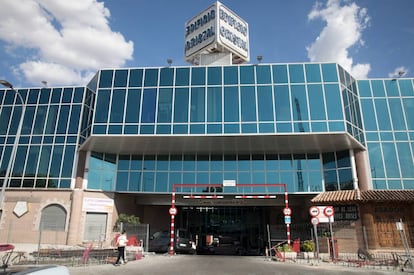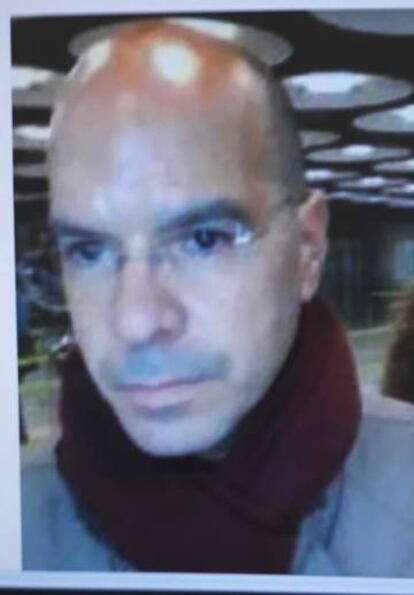Spain opens investigation into suicide of former Venezuelan oil chief
Márquez Caberera, who held a top post at PDVSA under Hugo Chávez, was found hanging from his own belt just days after agreeing to cooperate in a money laundering probe

Spanish investigators are probing the circumstances surrounding the death of a top former official at Venezuela’s state oil company whose body was found in Madrid a week ago.
His death deprives investigators of key information about several ongoing cases
Juan Carlos Márquez Cabrera had held a top post at Venezuela’s PDVSA during the presidency of Hugo Chávez, and he was caught up in a judicial investigation into money laundering with the oil company’s funds.
The probe also affects Raúl Morodo, a former Spanish ambassador to Venezuela, and his son Alejo, who allegedly received €4.5 million from PDVSA in exchange for phony consulting work in Europe.
Márquez Cabrera, who had expressed a willingness to cooperate with the investigation in statements to the judge made on July 19, was found dead two days later inside a house in Alcobendas (Madrid).
While he was found hanging from his own belt, suggesting suicide, Spain’s High Court, the Audiencia Nacional, has ordered an investigation into his death. No suicide note was found.

Members of the investigation have expressed surprise at the fact that Márquez Cabrera would kill himself shortly after flying in from the United States, telling the judge he knew “many things” about PDVSA and the former ambassador, and showing a willingness to cooperate.
Back in Venezuela the 48-year-old had been secretary general of Corporate Entities, answering to then-energy minister Rafael Ramírez, whose whereabouts are currently unknown and who is wanted by prosecutors in his country. Under the Chávez regime, Márquez Cabrera oversaw tens of millions of dollars’ worth of transactions made by South America’s largest oil company.
Around €4.5 million ended up in Europe, where the son of former ambassador Raúl Morodo (who served between 2004 and 2007) is thought to have done fictitious consulting work for PDVSA between 2008 and 2012.
Márquez Cabrera was an essential figure in the Morodo case under investigation at Spain’s High Court. After providing testimony before Judge Santiago Pedraz, he was released but continued to face charges, and was barred from leaving Spain.
The former PDVSA official had flown in from the US in the knowledge that he would be detained in Madrid because of an arrest warrant against him. He was practically turning himself in, said sources familiar with the investigation.
Interpol mistake
On Friday afternoon, after Márquez Cabrera had testified before the judge, Interpol authorities in Washington alerted the Spanish police about his presence on a Chicago-bound flight, and said he would be immediately deported back to Spain. This turned out to be a mistake: the Venezuelan official had booked the flight but never got on it.
The probe also affects Raúl Morodo, a former Spanish ambassador to Venezuela, and his son Alejo
His body was found on Sunday at 2.20pm inside an office building in San Sebastián de los Reyes-Alcobendas, 18 kilometers north of the capital, after a friend and business partner, who was repeatedly unable to contact him, called the police.
His death deprives investigators of key information about several ongoing cases involving former PDVSA officials who are now residing in Spain. An internal investigation by the oil company calculates that several former executives funneled away at least $500 million by awarding contracts to their own businesses and rigging bids, then laundering the proceeds in Spain.
English version by Susana Urra.
Tu suscripción se está usando en otro dispositivo
¿Quieres añadir otro usuario a tu suscripción?
Si continúas leyendo en este dispositivo, no se podrá leer en el otro.
FlechaTu suscripción se está usando en otro dispositivo y solo puedes acceder a EL PAÍS desde un dispositivo a la vez.
Si quieres compartir tu cuenta, cambia tu suscripción a la modalidad Premium, así podrás añadir otro usuario. Cada uno accederá con su propia cuenta de email, lo que os permitirá personalizar vuestra experiencia en EL PAÍS.
¿Tienes una suscripción de empresa? Accede aquí para contratar más cuentas.
En el caso de no saber quién está usando tu cuenta, te recomendamos cambiar tu contraseña aquí.
Si decides continuar compartiendo tu cuenta, este mensaje se mostrará en tu dispositivo y en el de la otra persona que está usando tu cuenta de forma indefinida, afectando a tu experiencia de lectura. Puedes consultar aquí los términos y condiciones de la suscripción digital.








































